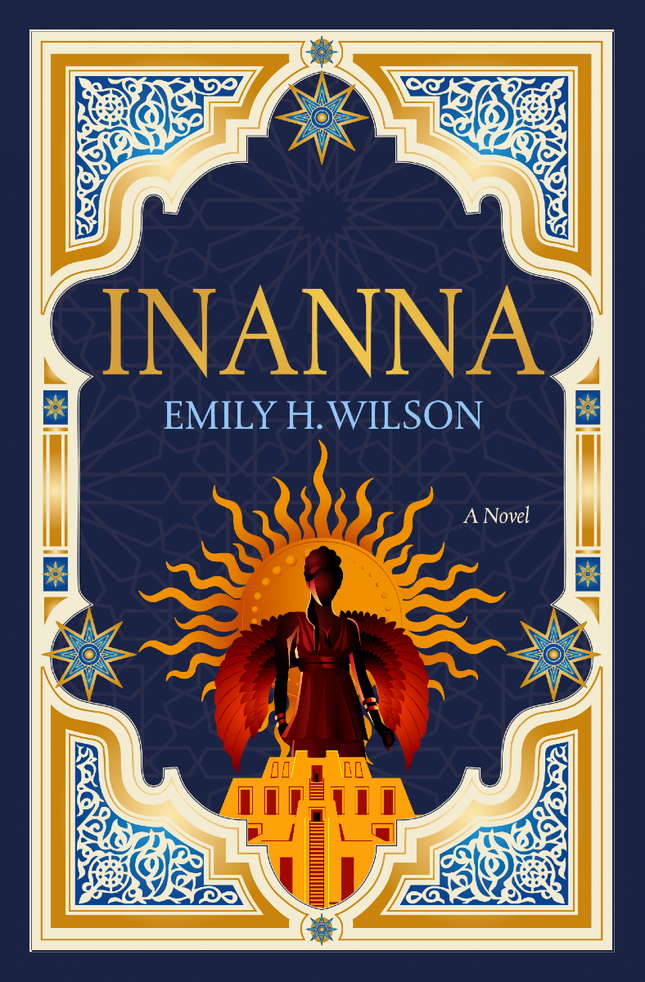
6 stars
First Sentence: In Athens they call me Aphrodite now.
Thoughts: Before Venus, Aphrodite, Astarte, and Ishtar there was Inanna, the original goddess of love (and war). This is her story.
The Annunaki have been the gods of Sumeria for centuries but they haven’t been able to breed true since they came to this world. They’ve had any number of half-god and human children, but no true Annunaki until Inanna came along. Her parents, Nanna and Ningal, had no clue how they managed to have a truly divine child, or at least that’s what they told everyone. Even the chief god An wasn’t sure how Inanna came to be. Not one to look a gift divine in the mouth, he gave Inanna her holy mee and told her she was the Goddess of Love. And War, he whispered in her ear when no one was looking.
Inanna grew up the pampered child of gods. When she was eleven she convinced her mother to let her have a human friend, and that’s how she met Princess Amnut of Ur. They had a wonderful time roaming the temples, palaces, and countryside collecting bugs until Amnut’s father died. Inanna’s father Nanna supervised the preparations for the royal burial, making sure all the appropriate traditions were followed. A huge grave, perfectly square, was dug and the tomb built in the center. Then it was time for the funeral. The king’s body was put in the tomb, followed by his wives carrying cups of poison so they could join him in the afterlife. The rest of his household picked up their poison goblets and arranged themselves in the grave. Even Amnut, Inanna was horrified to discover. Amnut had promised her father she’d join him in the afterlife. And that’s how Inanna learned about mortality and the pain that comes from friendship with humans.
Soon after Inanna was betrothed to Dumuzi, the God of Sheep and son of Enki. She was shipped of to Enki’s city Eridu with all the warnings her mother could give her. Ningal had bad memories of her time with Enki after the Annunaki arrived in Sumeria. She told Inanna the best thing to do was submit, which she does.
Meanwhile in the north Gilgamesh has been captured by Akka, the king of Kish, who’s been warring against the southern Sumerians. Since Gilgamesh is both royal and the son of gods, Akka treats him well and welcomes him into the family fold despite his hostage status. Then Akka goes south to check on the war. While he’s away Gilgamesh gets in trouble when he’s caught feeling up the king’s sister and gets thrown in the dungeon. He’s freed by one of his retainers and returns home just in time to find out that five months ago, before he left on his latest tour of duty, he got the god Enlil’s daughter Della pregnant.
Shotguns hadn’t been invented yet, but Enlil’s wrath is even more dangerous. Gilgamesh and Della had a Divine Wrath wedding and then Gilgamesh was sent back home to think about what he did. He got word of a wild man roaming around the area and goes to investigate. That’s when Gilgamesh met Enkidu.
Down south in Africa, Ninshubar has achieved her dream of being the First Hunter of her tribe. Her father promised she’d be the next leader of the tribe when he died, but he didn’t tell anyone else so when he did die his wife took over. Ninshubar and her mother most definitely did not get along. But she found a new purpose in her life when she adopted the Potta, a strange pale man with reddish hair that a neighboring tribe left with her. When Ninshubar’s mother told her it was time to marry, Ninshubar and the Potta ran north to the coast. There the Potta was attacked and left bleeding on the beach while Ninshubar was captured by strange sailors. They took her to Eridu where she was sold as a temple slave.
This is where the three stories start to come together. Gilgamesh and Enkidu are sent south by Enlil to check on the new god and goddess of Nippur, Inanna and Dumuzi. Ninshubar and Ningal run afoul of Enki and find themselves in the same dungeon cell. Inanna finds out that Dumuzi is trying to overthrow her and decides to cut him off at the pass by visiting her sister Ereshkigal in the underworld. Enkidu is killed which sends Gilgamesh on a quest to find the secret to immortality.
As I’m sure you’ve figured out, this is a retelling of the Epic of Gilgamesh interspersed with the surviving legends of Inanna, specifically the one where she follows Dumuzi to the underworld. It’s also about some of the legends that have popped up about the Sumerian gods since the heyday of Babylon, specifically the one that says the Annunaki were actually extraterrestrials. Fortunately Wilson doesn’t lean too heavily into that one. It’s there, especially near the end, but it’s introduced in such a way that it doesn’t ruin the historical fantasy feel of the rest of the book. It does add an otherworldly flavor to the story, though, which makes it one of the best new fantasy books of this decade.
But we’re only four years into this decade.
Quiet, voice in the crowd. I said what I said.
[…] Inanna, Emily H. Wilson December 26, 2023 […]
LikeLike